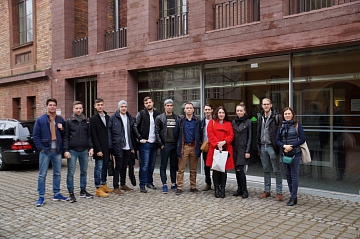ASU students underwent ecological training in Germany
 Students of Rubtsovsk Branch of Altai State University completed ecological training in three German universities. They gained the opportunity to undergo the internship by participation in all-Russian ecological quest. The internship program consisted of visiting three German universities (two of which are considered to be the “green universities” of Germany) and taking part in workshops on ecological initiatives.
Students of Rubtsovsk Branch of Altai State University completed ecological training in three German universities. They gained the opportunity to undergo the internship by participation in all-Russian ecological quest. The internship program consisted of visiting three German universities (two of which are considered to be the “green universities” of Germany) and taking part in workshops on ecological initiatives.
The first university to visit was Eberswalde University for Sustainable Development (Hochschule fur nachhaltige Entwicklung Eberswalde), which one of the most sustainable and environment-friendly educational establishments of Germany. In Eberswalde students attended lectures on ecological management and environmental friendliness. Some of the classes were carried out in a laboratory located outdoors. One of the Eberswalde students took Russian guests on a tour around the university and told them about the principles of ecological neutralism. Then ASU students participated in several workshops, where they discussed the problems of sustainability and such ecological projects as wechange.de, Netzwerk N, Trial and Error.
Next ASU representatives set off for Leuphana University of Lüneburg – another “green university” located in the north of Germany. Authorities and students of the higher education establishments delivered a number of lectures on the principles of separate waste collection and ecological initiatives realized by Leuphana.
The last stage of training included visit to the Free University of Berlin, where the lecture about ecological events took place. The students of Altai State University were invited to take part in the conference that will be held on 27–30 March 2017 in Berlin. This event will be dedicated to sustainable development of higher educational institutions of the world.
Over a period of training students got acquainted with different interesting people, who work with ecological problems, create ecological technologies and initiatives, and acquired new useful knowledge.